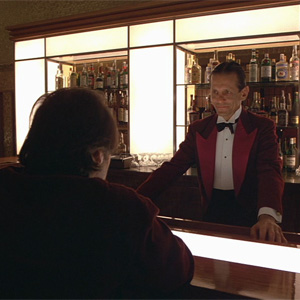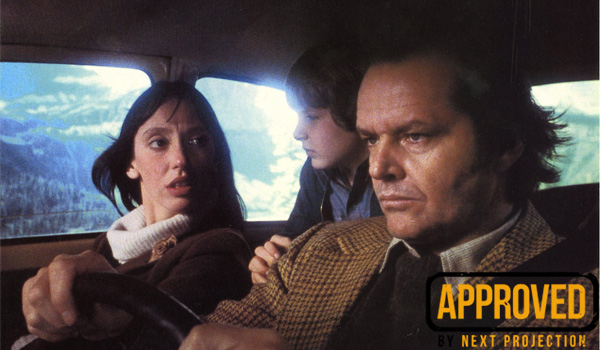Review: The Shining (1980)
Cast: Jack Nicholson, Shelley Duvall, Danny Lloyd, Scatman Crothers
Director: Stanley Kubrick
Country: UK | USA
Genre: Drama, Horror
Official Trailer: Here
Editor’s Note: This review of The Shining is a part of Matthew Blevins’s Stanley Kubrick Spotlight.
By now we’re all familiar with the opening shots of a mountain passage as the camera swoops near trees, over jagged peaks, and over rushing mountain rapids as the blaring synth score sets the sinister undertones for Kubrick’s iconic horror film. This is the art of Kubrick. We’re in his realm now, and any perceived imperfections in the adaptation from the source material are irrelevant. This is a new interpretation that has little to do with King’s original novel. If film were capable of perfectly expressing the ideas contained in literature then there would be no need for literature. Film has its own power that is impossible to translate in to words, and each form of art carries its own merits, operates by its own rules, and owes nothing to the other forms of expression. This is a standalone work that merely uses its source material as a rudimentary framework and the means to wrap Kubrick’s highly effective filmmaking in to a digestible narrative. Kubrick uses the mastery of his craft to disorient the viewer and to play tricks on our subconscious, manipulating the audience like a finely tuned instrument and making us feel unsettled in ways that we may not be able to understand or articulate.
Kubrick achieves this disorientation through the constant use of unquantifiably disconcerting tracking shots that traverse the Overlook hotel and pass through illogical spatial arrangements that aren’t easy to spot. Our mind is never quite at ease, especially during sequences where we follow Wendy (Shelley Duvall) through the labyrinthine hotel. We are never allowed to be at ease with our cinematic surroundings because Wendy is not at ease, but we can’t place our finger on exactly why. Our mind is never allowed to sort out an approximation of a floor plan because the spaces defy logic. We don’t necessarily know that this is happening unless we have minds that are acutely aware of spatial anomalies, but as our subconscious works desperately to try and put together our surroundings we are left with feelings of anxiety and panic. Kubrick jumps between his purposely disorienting tracking shots of Wendy and the iconic scenes of Danny riding his big wheel over patterned floors, adding fuel to the fires of disorientation. We subconsciously hate the spaces in the hotel because Kubrick wants us to share in Wendy’s tension and disorientation. Nearly every tracking shot that takes place in or around the hotel is purposefully bewildering with the exception of shots of Jack. He is at ease with these disorienting surroundings because of the gift that he possesses but does not understand.
Our mind is never allowed to sort out an approximation of a floor plan because the spaces defy logic. We don’t necessarily know that this is happening unless we have minds that are acutely aware of spatial anomalies, but as our subconscious works desperately to try and put together our surroundings we are left with feelings of anxiety and panic.
 Unnatural lighting is another key element in Kubrick’s task of disorienting the audience. The living spaces in the film contain impossible windows that saturate every frame with sickly artificial light. The light is pervasive and erases most shadows in these illogical spaces. The lack of shadows highlights the emotional instability of the Torrance family, and the cracks in their contrived surface when interacting with people outside of their family are exposed because there is nowhere to hide the scarring that lies beneath. It shines unforgiving light on Wendy’s discomforted and frazzled face as she tries to excuse her husband’s prior problems with alcohol and violent tendencies using the cliched dialogue that every battered and emotionally damaged woman acquaints herself with. It also serves a utilitarian purpose as the light illuminates the frames for Kubrick’s deep focus compositions and allows the camera the freedom to move within these spaces uninhibited by any demarcation points between the world of the production and the world within the film. The film’s sinister world is all encompassing, and the hotel is isolated from the physics and logic of the natural world.
Unnatural lighting is another key element in Kubrick’s task of disorienting the audience. The living spaces in the film contain impossible windows that saturate every frame with sickly artificial light. The light is pervasive and erases most shadows in these illogical spaces. The lack of shadows highlights the emotional instability of the Torrance family, and the cracks in their contrived surface when interacting with people outside of their family are exposed because there is nowhere to hide the scarring that lies beneath. It shines unforgiving light on Wendy’s discomforted and frazzled face as she tries to excuse her husband’s prior problems with alcohol and violent tendencies using the cliched dialogue that every battered and emotionally damaged woman acquaints herself with. It also serves a utilitarian purpose as the light illuminates the frames for Kubrick’s deep focus compositions and allows the camera the freedom to move within these spaces uninhibited by any demarcation points between the world of the production and the world within the film. The film’s sinister world is all encompassing, and the hotel is isolated from the physics and logic of the natural world.
The lack of shadows highlights the emotional instability of the Torrance family, and the cracks in their contrived surface when interacting with people outside of their family are exposed because there is nowhere to hide the scarring that lies beneath. It shines unforgiving light on Wendy’s discomforted and frazzled face as she tries to excuse her husband’s prior problems with alcohol and violent tendencies using the cliched dialogue that every battered and emotionally damaged woman acquaints herself with.
 Performances are a key element in elevating the mundane conversations between members of this fractured family in to tense awkward exchanges that rage with an undercurrent of unspoken hostility. Jack Nicholson seems to choose each word carefully before letting it loose because he is moments away from flying off the hinges at all times, even before the dark influences of the hotel have completely taken hold over him. Shelley Duvall’s portrayal of Wendy is one of frailty and unrestrained vulnerability because of Kubrick’s Hitchcockian treatment of her during the making of the film. She is moments away from an emotional meltdown at any given moment, and her frazzled hair and world weary eyes show a woman desperate to hold her family together, knowing that at this point all hope is lost.
Performances are a key element in elevating the mundane conversations between members of this fractured family in to tense awkward exchanges that rage with an undercurrent of unspoken hostility. Jack Nicholson seems to choose each word carefully before letting it loose because he is moments away from flying off the hinges at all times, even before the dark influences of the hotel have completely taken hold over him. Shelley Duvall’s portrayal of Wendy is one of frailty and unrestrained vulnerability because of Kubrick’s Hitchcockian treatment of her during the making of the film. She is moments away from an emotional meltdown at any given moment, and her frazzled hair and world weary eyes show a woman desperate to hold her family together, knowing that at this point all hope is lost.
Shelley Duvall’s portrayal of Wendy is one of frailty and unrestrained vulnerability because of Kubrick’s Hitchcockian treatment of her during the making of the film. She is moments away from an emotional meltdown at any given moment…
 The power of Jack’s performance may detract a bit from the possibility that Jack Torrance is an innocent in the film, but we must remember that we aren’t really allowed to see him before the hotel has influenced his behavior. The dark imprints of the Overlook have been manipulating him since the moment he walked in to his job interview, but he doesn’t know what to do with these strange vibrations. He is in possession of the same “gift” as Danny, but never really knew what to do with it or why it was happening. This may have fueled his animosity toward Danny even before their arrival at the hotel, and could have been the reasons behind his problems with anger management and alcohol. If we accept the pretense that the Overlook is in possession of dark influences, someone entering an environment that is charged with that much negative energy without knowing how to process those feelings would surely fall in to madness. Jack’s possession of the “Shining” could have been a lifelong mystery to him that would finally claim him forever.
The power of Jack’s performance may detract a bit from the possibility that Jack Torrance is an innocent in the film, but we must remember that we aren’t really allowed to see him before the hotel has influenced his behavior. The dark imprints of the Overlook have been manipulating him since the moment he walked in to his job interview, but he doesn’t know what to do with these strange vibrations. He is in possession of the same “gift” as Danny, but never really knew what to do with it or why it was happening. This may have fueled his animosity toward Danny even before their arrival at the hotel, and could have been the reasons behind his problems with anger management and alcohol. If we accept the pretense that the Overlook is in possession of dark influences, someone entering an environment that is charged with that much negative energy without knowing how to process those feelings would surely fall in to madness. Jack’s possession of the “Shining” could have been a lifelong mystery to him that would finally claim him forever.
One of the most effective components of The Shining is the pitch black humor. Kubrick is a man of dry wit, and the comedy in The Shining is quite intentional. It shows his subversive sense of humor despite the seriousness of the film’s tone. The elaborate lengths that Scatman Crothers’ Dick Hallorann goes through to reach the hotel and the subsequent outcome illustrates this wit perfectly. Comedy is about the unexpected, and the amount of time spent focusing on Hallorann’s journey is a key element in setting up the elaborate joke while keeping the audience out of the loop at all times. A first time viewer that has somehow avoided learning of Hallorann’s fate would be taken aback by what happens to him when he arrives. It defies reasonable expectations and is at once startling and hilarious. It isn’t merely a one-off joke that is superfluously included; it also serves as a distraction that pulls Jack away from Wendy during the iconic bathroom scene, as well as providing Wendy and Danny transportation away from the hotel once they manage their escape. The entire film is laced with subversive humor and disturbing non-sequiturs, but nothing in the film is extraneous. Kubrick knows how to use these elements in service of Jack’s descent in to madness and the creation of a sinister atmosphere, adding more fuel to the emotional anxiety of the viewer as they are unable to process and contextualize the mixed tones.
The entire film is laced with subversive humor and disturbing non-sequiturs, but nothing in the film is extraneous.
 Kubrick’s version of the story leaves open possibilities that Stephen King’s does not, key among these is the possibility that the apparitions and negative energies of the Overlook are just the manifestations of a crazed alcoholic suffering from writer’s block and feelings of alienation from his family. It is possible that Jack has slowly lost his grip on reality and that everything we see is the result of the mental instability of an unreliable narrator. Should we even attempt to make sense of the mysteries of The Shining, or do we let those mysteries remain unexplored? It is natural for the human mind to try and bring order to the mysterious and force everything within the restricting confines of logical context, but in the case of this film it is better to leave the unanswered questions alone instead of engaging in boring pedantic debates about something as silly as plot. We can hypothesize about the semiotics of every densely packed frame, but the film is far more effective if you let the horror take hold and do what it does best. Let it terrify the primal areas of your brain that aren’t firmly planted in the arrogant confines of logic as the soundtrack screeches with a single repeated note until the tension is unbearable. Let the spatial anomalies do their work on you subconsciously as awareness of this trickery can dull the intended anxiety from the experience. If you can feign that kind of innocence and mental vulnerability for its runtime, then you can relinquish yourself completely to one of the most effective horror films ever made.
Kubrick’s version of the story leaves open possibilities that Stephen King’s does not, key among these is the possibility that the apparitions and negative energies of the Overlook are just the manifestations of a crazed alcoholic suffering from writer’s block and feelings of alienation from his family. It is possible that Jack has slowly lost his grip on reality and that everything we see is the result of the mental instability of an unreliable narrator. Should we even attempt to make sense of the mysteries of The Shining, or do we let those mysteries remain unexplored? It is natural for the human mind to try and bring order to the mysterious and force everything within the restricting confines of logical context, but in the case of this film it is better to leave the unanswered questions alone instead of engaging in boring pedantic debates about something as silly as plot. We can hypothesize about the semiotics of every densely packed frame, but the film is far more effective if you let the horror take hold and do what it does best. Let it terrify the primal areas of your brain that aren’t firmly planted in the arrogant confines of logic as the soundtrack screeches with a single repeated note until the tension is unbearable. Let the spatial anomalies do their work on you subconsciously as awareness of this trickery can dull the intended anxiety from the experience. If you can feign that kind of innocence and mental vulnerability for its runtime, then you can relinquish yourself completely to one of the most effective horror films ever made.























 Review: 42 (2013)
Review: 42 (2013) DVD Review: A Man Escaped (1956)
DVD Review: A Man Escaped (1956) Review: To the Wonder (2012)
Review: To the Wonder (2012) Review: Upstream Color (2013)
Review: Upstream Color (2013) Review: The Company You Keep (2013)
Review: The Company You Keep (2013)




